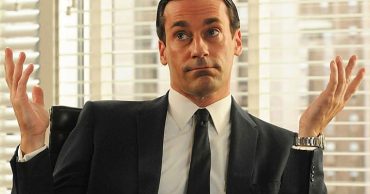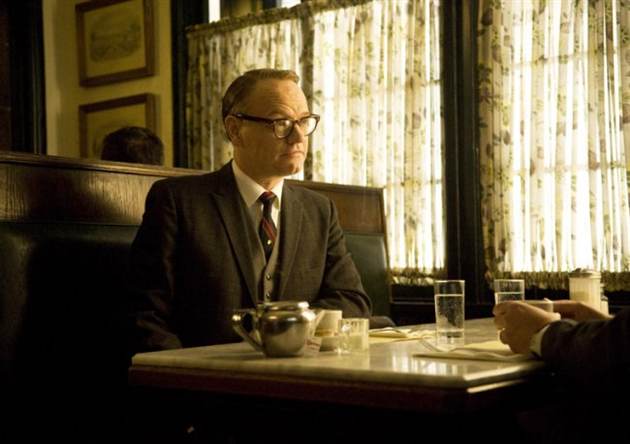 I have been sick for what feels like a month so I could be forgiven thinking that the most recent episode was less the culminating chord in a season about to wind up and more a fever-dream slide show of deceit and betrayal. The good news is that my fever broke. The bad news is that I can’t blame ‘The Other Woman’on a fever.
I have been sick for what feels like a month so I could be forgiven thinking that the most recent episode was less the culminating chord in a season about to wind up and more a fever-dream slide show of deceit and betrayal. The good news is that my fever broke. The bad news is that I can’t blame ‘The Other Woman’on a fever.
Not that I think we’re in true ‘shark jumping’territory, but while the first few episodes of the season grappled with tone in a way that I haven’t seen in the series until this season, those leading to the season wrap-up is committed to a tone, and a theme, with a nagging consistency.
Warning: the following paragraphs contain spoilers, disillusionment and at least one split infinitive.
Stephen King once wrote about the bond a reader can form with a fictional character, one that is inexplicably strong for someone who exists solely in print and the reader’s mind. When he read John Irving’s The World According to Garp, he wrote that he was so shocked by the death of the protagonist’s youngest son that he put the book down and didn’t return to it for days. (I told you there were spoilers…I just didn’t mention that it was for a thirty-four year-old novel).
I try to untangle my feelings toward characters and those I harbour against those that create them. Of course, my heart aches for poor Joan. If she were a friend of my wife, I would treat her with extra kindness when she came to visit, make tea for the two women, and then take my dutiful leave so they might discuss Joan’s trials in private.
As for Matthew Weiner (and episode co-writer Semi Challas), I am perturbed. The list of travails laid at this character’s feet has started to beggar the imagination. After Joan surrendered herself to a sleazy head of the powerful Dealer’s Association so the agency could finally land the Jaguar account, I took stock of what Joan has been through since the show began. She was raped by the man who eventually became her husband; fathered a child out of wedlock, the paternity of which she did not reveal to her husband; faced the indignity of being a single parent at a time when that was sternly frowned upon, along with the coup de grace that was her husband suing her for divorce before she could act. This is the kind of tortured storyline more at home in a 20th century daily serial than a 21st century night time drama.
The arguments are all fair: a woman in business at that time would not have many opportunities to crawl up on the corporate totem pole; she has to provide for herself and a young child in the most expensive city in the world; she’s a big fan of soap operas, so why shouldn’t her storyline read like one?
My problem is the compression of this within a single hour. Lane Pryce has had multiple episodes to fret over his money woes–in fact, the arc of this character stands in direct opposition to Joan’s development. If a character is to commit an act that, on face value, is wholly uncharacteristic, then attention must be paid. Lane has had to endure the strains of keeping a stiff upper lip at home and at work while wolves scratch at the door, so that when he finally defrauds his own company of money to throw the hunters off the scent it actually makes sense.
Joan is a strong woman, and it is a strength that does not preclude fear and self-doubt. The swiftness with which she moves from outrage to contemplation of this act of prostitution is hard to take. I don’t think that scenes shoe-horned in to broadly paint desperation would have worked either (Joan sitting at a dining room table awash in past due bills, a cascade of malfunctioning appliances, a closet full of threadbare clothes where there was once a regal wardrobe)–this is the sort of landscape changer that requires more room to breathe. Imagine if Lane’s arc and Joan’s were switched, and we had to watch Joan (a character integral to the series from the start) wrestle with this possibility, her own fate and that of the agency hanging in the balance, and a creeping sense of dread as she moved inexorably toward a horrible, horrible decision. That would have made for better viewing and allowed us to understand Joan’s decision, and even believe in it.
There is a moment that almost makes this development worthwhile. When Pete and the other partners discuss the proposition made by the corpulent lecher (as a portly fellow myself, I noticed that of course the guy defiling Joan had to be big–but at least he bought her a nice necklace, right?), the insanity of the discussion, and one attended exclusively by men, has potential. It reminded me of a pivotal scene in Paddy Chayefsky’s Network, where television executives gather to discuss how best to deal with an out-of-control, genuinely insane star of a hit television show. When the discussion turns the live broadcast of his assassination, it doesn’t feel the least bit strange. As a viewer it does, but watching those characters discuss those options in that world is sensible given everything that preceded it. As for a similar scene in ‘The Other Woman’, this is just not the case. At least in Chayefsky’s case, he didn’t have characters openly remark on the bizarre nature of the conversation as a way to cover the fact that the characters are engaged in, well, a bizarre conversation.
As for another integral character’s landscape-changing decision, Peggy’s departure from Sterling Cooper Draper Pryce and from Don’s tutelage is an event that has been built toward all season. The emotional impact of her decision and Don’s heart-broken response is devastating. It is also, most importantly, believable.
Joan deserved just as much attention.
Like what you’ve read? Sure you did! Jump over to Amazon to get my book Kings of Madison Avenue: The Unofficial Guide to Mad Men
And you can always find me at jessemclean.ca or on twitter @kungfugripe
 Follow Us
Follow Us



